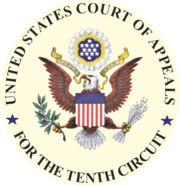United States v. Solon
| United States v. Solon | |
|---|---|
 | |
| Court | United States Court of Appeals for the Tenth Circuit |
| Full case name | United States of America v. Nathaniel Solon |
| Decided | February 17, 2010 |
| Citation | 596 F.3d 1206 |
| Court membership | |
| Judges sitting | Deanell Reece Tacha, Stephanie Kulp Seymour, Carlos F. Lucero |
| Case opinions | |
| Majority | Tacha, joined by Seymour |
| Concur/dissent | Lucero |
United States v. Solon, 596 F.3d 1206 (10th Cir. 2010),[1] was a case in which Nathaniel Solon, a resident of Casper, Wyoming, was convicted for possession of child pornography. The case became known in the media for irregularities in the process, and suspicions (affirmed by the defendant) that the material was introduced by malware on the computer.[2][3] There were other people accused of similar crimes, who were later acquitted,[3][4] but Solon was never exonerated.
Background
[edit]Nathaniel Solon was charged on January 18, 2007, by the indictment with possessing child pornography. On October 2, 2007, he pleaded guilty. When he came back for another hearing on January 8, 2008, however, Solon stated that he was an innocent man, and the only reason that he had pleaded guilty in the first place was because he believed that he did not have the financial resources to hire an expert witness to investigate his defense. In regard to his explanation, the court appointed him a private attorney to represent him. With the court's approval, Solon was able to request an expert witness, with an investigation budget of $20,000 supplied by the court.
See also
[edit]References
[edit]- ^ United States v. Solon, 596 F.3d 1206 (10th Cir. 2010).
- ^ MORTON, Tom. Casper man convicted of child porn makes final appeal (25/10/2011). Copy 1Copy 2
- ^ a b ROBERTSON, Jordan. https://www.nbcnews.com/id/wbna33778733 (11/08/2009). Copy on FramedForChildPorn.com, copy on FoxNews
- ^ KOTADIA, Munir. Trojan horse found responsible for child porn[dead link] (04/08/2003). Copy at FramedForChildPorn.com
External links
[edit]- Framed for Child Porn, a website collecting similar cases, inspired on this case.
- Text of United States v. Nathaniel Solon, 596 F.3d 1206 (10th Cir. 2010) is available from: CourtListener Findlaw Google Scholar Justia Leagle
- American people convicted of child pornography offenses
- United States computer case law
- United States Court of Appeals for the Tenth Circuit cases
- United States due process case law
- United States Internet case law
- 2010 in United States case law
- Child pornography law
- Casper, Wyoming
- Malware
- United States case law stubs
